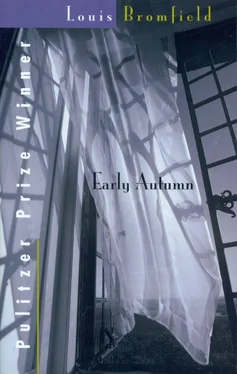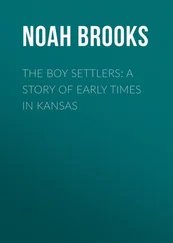And to Miss Peavey she also said, “It’s at times like this that one’s breeding comes out. Olivia has failed for the first time. She doesn’t understand the things one must do at a time like this. If she had been brought up properly, here among us. …”
For with Aunt Cassie death was a mechanical, formalized affair which one observed by a series of traditional gestures.
It was a remarkable bit of luck, she said, that Bishop Smallwood (Sabine’s Apostle to the Genteel) was still in the neighborhood and could conduct the funeral services. It was proper that one of Pentland blood should bury a Pentland (as if no one else were quite worthy of such an honor). And she went to see the Bishop to discuss the matter of the services. She planned that immensely intricate affair, the seating of relations and connections—all the Canes and Struthers and Mannerings and Sutherlands and Pentlands—at the church. She called on Sabine to tell her that whatever her feelings about funerals might be, it was her duty to attend this one. Sabine must remember that she was back again in a world of civilized people who behaved as ladies and gentlemen. And to each caller whom she received in the darkened drawing room, she confided the fact that Sabine must be an unfeeling, inhuman creature, because she had not even paid a visit to Pentlands.
But she did not know what Olivia and John Pentland knew—that Sabine had written a short, abrupt, almost incoherent note, with all the worn, tattered, pious old phrases missing, which had meant more to them than any of the cries and whispering and confusion that went on downstairs, where the whole countryside passed in and out in an endless procession.
When Miss Peavey was not at hand to run errands for her, she made Anson her messenger. … Anson, who wandered about helpless and lost and troubled because death had interrupted the easy, eventless flow of a life in which usually all moved according to a set plan. Death had upset the whole household. It was impossible to know how Anson Pentland felt over the death of his son. He did not speak at all, and now that “The Pentland Family and the Massachusetts Bay Colony” had been laid aside in the midst of the confusion and Mr. Lowell’s desk stood buried beneath floral offerings, there was nothing to do but wander about getting in the way of everyone and drawing upon his head the sharp reproofs of Aunt Cassie.
It was Aunt Cassie and Anson who opened the great box of roses that came from O’Hara. It was Aunt Cassie’s thin, blue-veined hand that tore open the envelope addressed plainly to “Mrs. Anson Pentland.” It was Aunt Cassie who forced Anson to read what was written inside:
“Dear Mrs. Pentland,
You know what I feel. There is no need to say anything more.
—Michael O’Hara.”
And it was Aunt Cassie who said, “Impertinent! Why should he send flowers at all?” And Aunt Cassie who read the note again and again, as if she might find in some way a veiled meaning behind the two cryptic sentences. It was Aunt Cassie who carried the note to Olivia and watched her while she read it and laid it quietly aside on her dressing table. And when she had discovered nothing she said to Olivia, “It seems to me impertinent of him to send flowers and write such a note. What is he to us here at Pentlands?”
Olivia looked at her a little wearily and said, “What does it matter whether he is impertinent or not? Besides, he was a great friend of Jack’s.” And then, straightening her tired body, she looked at Aunt Cassie and said slowly, “He is also a friend of mine.”
It was the first time that the division of forces had stood revealed, even for a second, the first time that Olivia had shown any feeling for O’Hara, and there was something ominous in the quietness of a speech made so casually. She ended any possible discussion by leaving the room in search of Anson, leaving Aunt Cassie disturbed by the sensation of alarm which attacked her when she found herself suddenly face to face with the mysterious and perilous calm that sometimes took possession of Olivia. Left alone in the room, she took up the note again from the dressing table and read it through for the twentieth time. There was nothing in it … nothing on which one could properly even pin a suspicion.
So, in the midst of death, enveloped by the odor of tuberoses, the old lady rose triumphant, a phoenix from ashes. In some way she found in tragedy her proper role and she managed to draw most of the light from the other actors to herself. She must have known that people went away from the house saying, “Cassie rises to such occasions beautifully. She has taken everything on her own shoulders.” She succeeded in conveying the double impression that she suffered far more than any of the others and that none of the others could possibly have done without her.
And then into the midst of her triumph came the worst that could have happened. Olivia was the first to learn of the calamity, as she always came to know before any of the others knowledge, which old John Pentland possessed; and the others would never have known until the sad business of the funeral was over save for Aunt Cassie’s implacable curiosity.
On the second day, Olivia, summoned by her father-in-law to come to the library, found him there as she had found him so many times before, grim and silent and repressed, only this time there was something inexpressibly tragic and broken in his manner.
She did not speak to him; she simply waited until, looking up at last, he said almost in a whisper, “Horace Pentland’s body is at the Durham station.”
And he looked at her with the quick, pitiful helplessness of a strong man who has suddenly grown weak and old, as if at last he had come to the end of his strength and was turning now to her. It was then for the first time that she began to see how she was in a way a prisoner, that from now on, as one day passed into another, the whole life at Pentlands would come to be more and more her affair. There was no one to take the place of the old man … no one, save herself.
“What shall we do?” he asked in the same low voice. “I don’t know. I am nearly at the end of things.”
“We could bury them together,” said Olivia softly. “We could have a double funeral.”
He looked at her in astonishment. “You wouldn’t mind that?” and when she shook her head in answer, he replied: “But we can’t do it. There seems to me something wrong in such an idea. … I can’t explain what I mean. … It oughtn’t to be done. … A boy like Jack and an old reprobate like Horace.”
They would have settled it quietly between them as they had settled so many troubles in the last years when John Pentland had come to her for strength, but at that moment the door opened suddenly and, without knocking, Aunt Cassie appeared, her eyes really blazing with an angry, hysterical light, her hair all hanging in little iron-gray wisps about her narrow face.
“What is it?” she asked. “What has gone wrong? I know there’s something, and you’ve no right to keep it from me.” She was shrill and brittle, as if in those two days all the pleasure and activity surrounding death had driven her into an orgy of excitement. At the sound of her voice, both Olivia and John Pentland started abruptly. She had touched them on nerves raw and worn.
The thin, high-pitched voice went on. “I’ve given up all my time to arranging things. I’ve barely slept. I sacrifice myself to you all day and night and I’ve a right to know.” It was as if she had sensed the slow breaking up of the old man and sought now to hurl him aside, to depose him as head of the family, in one great coup d’état, setting herself up there in his place, a thin, fiercely intolerant tyrant; as if at last she had given up her old subtle way of trying to gain her ends by intrigue through the men of the family. She stood ready now to set up a matriarchy, the last refuge of a family whose strength was gone. She had risen thus in the same way once before within the memory of Olivia, in those long months when Mr. Struthers, fading slowly into death, yielded her the victory.
Читать дальше












